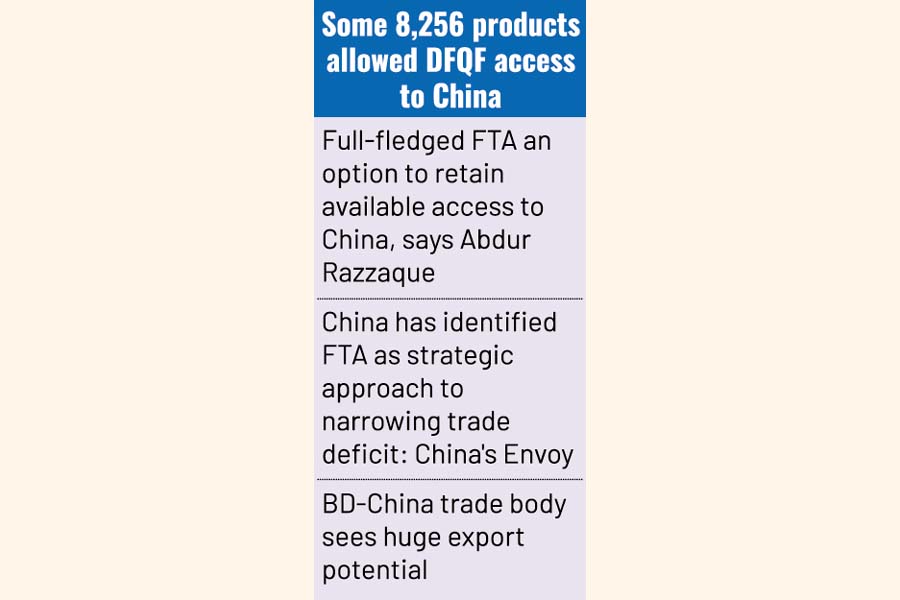Helping Bangladesh navigate post-graduation shocks
China plans FTA talks for trade boost

Published :
Updated :

China hopes to start negotiations with Bangladesh on free-trade agreement out of urgency to help the country weather post-graduation economic adversities from end of duty derogation.
"We have completed our feasibility study and hope that Bangladesh will complete its study by the first half of this year. Then we can start negotiations on the FTA from the second half," a senior official of the Chinese Embassy in Dhaka told the FE writer on Thursday.
He points out that China is keen to support Bangladesh in absorbing the post-graduation shocks and that is why it wants to expedite the deal-making process,
Because FTA will be a major instrument in reducing the trade imbalance between the two countries, he opines.
Presently, the volume of annual bilateral trade is worth US$21 billion with China's exports accounting for nearly 19 billion dollars.
The proposed FTA was the key issue of the meeting between Chinese envoy Yao Wen and state minister for Commerce Ahsan Titu on Wednesday, officials at the commerce ministry said.
Both sides agreed to expedite the FTA-signing process, they said.
Bangladesh and China have discussed promoting free-trade-agreement negotiation, providing more financial support for bilateral trade, and attracting more Chinese enterprises to invest in Bangladesh, officials from both sides mentioned.
Many feel that FTA can boost Bangladesh's export to China and thus reduce the trade gap.
"A full-fledged FTA is an option to retain the available market access in China," says Abdur Razzaque, research director of local think-tank Policy Research Institute of Bangladesh.
Bangladesh's export to China is much lower than that of its neighbours and competitors.
For example, Vietnam exported USD49 billion, India USD19 billion, Malaysia $38 billion and Thailand $30 billion in 2020-21, while Bangladesh exports could not cross one-billion-dollar mark.
Experts have said there is potential for export of leather and leather goods, IT-enabled services and marine fishes to the giant economy.
And if compliance can be ensured, mangoes, jackfruits and guavas can be exported to China which have high demand over there, says Al Mamun Mridha, secretary-general of the Bangladesh-China Chamber of Commerce and Industry.
"We can also export fresh foods, shrimp, crabs and eel fish, if we can maintain standards," he adds.
Also, he goes on listing the untapped prospects, investment by Chinese firms in the country's economic zones by setting up factories for accessories and import-substitution products can also help bridge the gap.
Bangladesh exported raw hides and skins worth $52.85 million in FY23, EPB data showed.
Under the Asia-Pacific Trade Agreement, China offers duty benefits for Bangladesh's 5,000 products.
Commenting on the FTA, Ambassador Yao Wen said China does not seek a unilateral surplus from Bangladesh.
"China has identified FTA as a strategic approach to narrowing down the trade deficit."
Both sides think it will help Bangladesh realise its export-diversification strategy and benefit the Bangladeshi people, said an official of the Chinese Embassy, adding that two sides spoke highly of the major achievements in trade and investment between Bangladesh and China.
A memorandum of understanding was signed between the ministries of commerce of the two countries on Launching a Joint Feasibility Study of China-Bangladesh Free Trade Agreement in October 2016.
Bangladesh Commerce Ministry officials have said FTAs help to enhance competitive advantage, increase market assessment for goods and services, strengthen investors' confidence and, to a large extent, build Bangladesh's economic sustainability.
The Chinese government offered Bangladesh Duty-Free, Quota-Free (DFQF) access for 97 per cent of Chinese tariff lines from 2020 and later it was enhanced to 98 per cent.
As a result, 8,256 products originating from Bangladesh will enjoy duty-and quota-free access to China-world's second-largest economy.
mirmostafiz@yahoo.com


 For all latest news, follow The Financial Express Google News channel.
For all latest news, follow The Financial Express Google News channel.